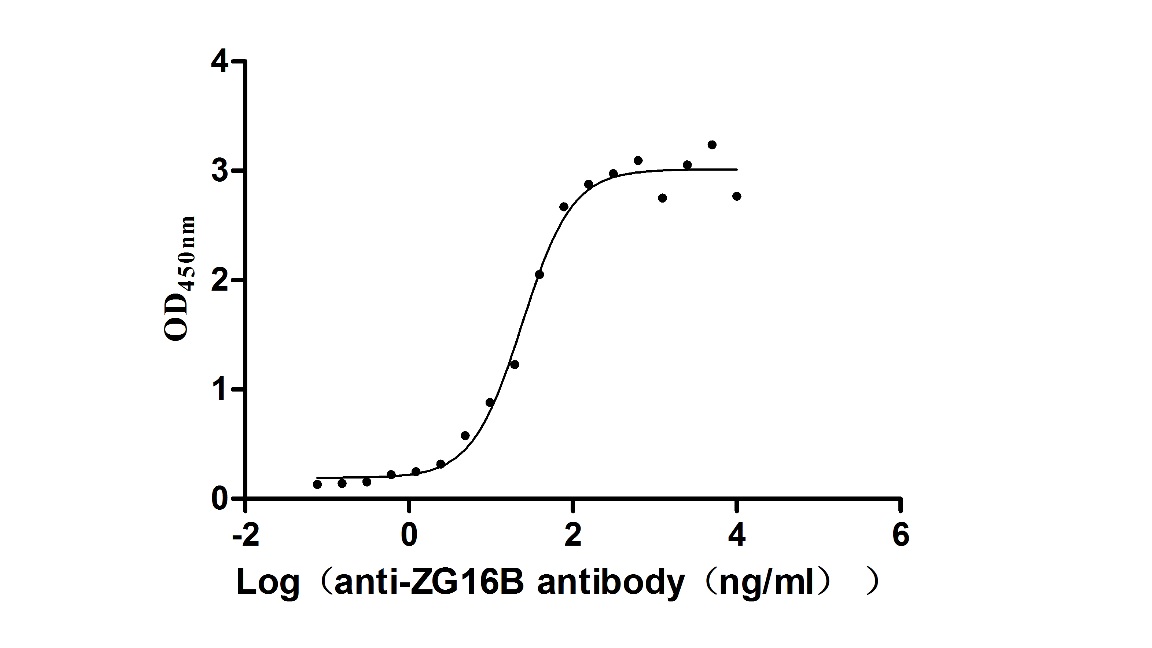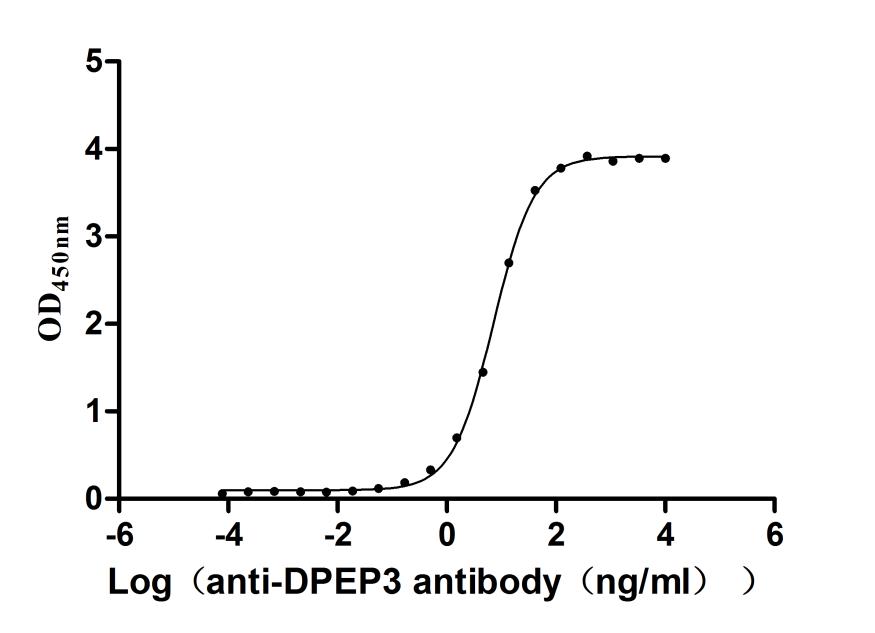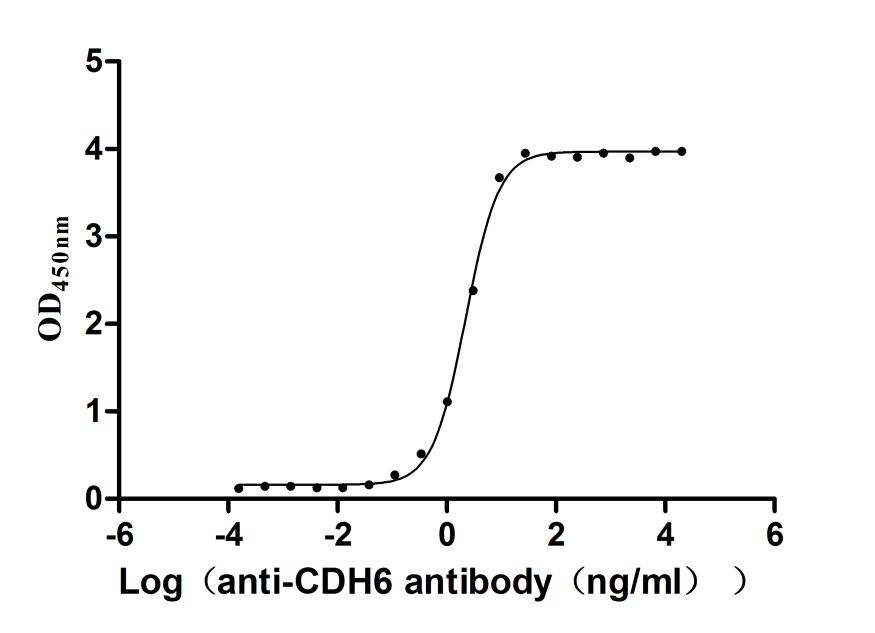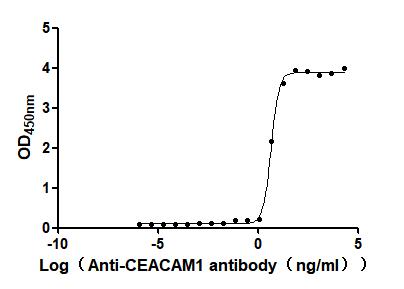Recombinant Human Regucalcin (RGN)
-
货号:CSB-YP623001HU
-
规格:
-
来源:Yeast
-
其他:
-
货号:CSB-EP623001HU
-
规格:
-
来源:E.coli
-
其他:
-
货号:CSB-EP623001HU-B
-
规格:
-
来源:E.coli
-
共轭:Avi-tag Biotinylated
E. coli biotin ligase (BirA) is highly specific in covalently attaching biotin to the 15 amino acid AviTag peptide. This recombinant protein was biotinylated in vivo by AviTag-BirA technology, which method is BriA catalyzes amide linkage between the biotin and the specific lysine of the AviTag.
-
其他:
-
货号:CSB-BP623001HU
-
规格:
-
来源:Baculovirus
-
其他:
-
货号:CSB-MP623001HU
-
规格:
-
来源:Mammalian cell
-
其他:
产品详情
-
纯度:>85% (SDS-PAGE)
-
基因名:RGN
-
Uniprot No.:
-
别名:Gluconolactonase; GNL; RC; Regucalcin; RGN; RGN_HUMAN; Senescence marker protein 30; SMP 30 ; SMP-30
-
种属:Homo sapiens (Human)
-
蛋白长度:full length protein
-
表达区域:1-299
-
氨基酸序列MSSIKIECVL PENCRCGESP VWEEVSNSLL FVDIPAKKVC RWDSFTKQVQ RVTMDAPVSS VALRQSGGYV ATIGTKFCAL NWKEQSAVVL ATVDNDKKNN RFNDGKVDPA GRYFAGTMAE ETAPAVLERH QGALYSLFPD HHVKKYFDQV DISNGLDWSL DHKIFYYIDS LSYSVDAFDY DLQTGQISNR RSVYKLEKEE QIPDGMCIDA EGKLWVACYN GGRVIRLDPV TGKRLQTVKL PVDKTTSCCF GGKNYSEMYV TCARDGMDPE GLLRQPEAGG IFKITGLGVK GIAPYSYAG
-
蛋白标签:Tag type will be determined during the manufacturing process.
The tag type will be determined during production process. If you have specified tag type, please tell us and we will develop the specified tag preferentially. -
产品提供形式:Lyophilized powder
Note: We will preferentially ship the format that we have in stock, however, if you have any special requirement for the format, please remark your requirement when placing the order, we will prepare according to your demand. -
复溶:We recommend that this vial be briefly centrifuged prior to opening to bring the contents to the bottom. Please reconstitute protein in deionized sterile water to a concentration of 0.1-1.0 mg/mL.We recommend to add 5-50% of glycerol (final concentration) and aliquot for long-term storage at -20℃/-80℃. Our default final concentration of glycerol is 50%. Customers could use it as reference.
-
储存条件:Store at -20°C/-80°C upon receipt, aliquoting is necessary for mutiple use. Avoid repeated freeze-thaw cycles.
-
保质期:The shelf life is related to many factors, storage state, buffer ingredients, storage temperature and the stability of the protein itself.
Generally, the shelf life of liquid form is 6 months at -20°C/-80°C. The shelf life of lyophilized form is 12 months at -20°C/-80°C. -
货期:Delivery time may differ from different purchasing way or location, please kindly consult your local distributors for specific delivery time.Note: All of our proteins are default shipped with normal blue ice packs, if you request to ship with dry ice, please communicate with us in advance and extra fees will be charged.
-
注意事项:Repeated freezing and thawing is not recommended. Store working aliquots at 4°C for up to one week.
-
Datasheet :Please contact us to get it.
相关产品
靶点详情
-
功能:Gluconolactonase with low activity towards other sugar lactones, including gulonolactone and galactonolactone. Can also hydrolyze diisopropyl phosphorofluoridate and phenylacetate (in vitro). Calcium-binding protein. Modulates Ca(2+) signaling, and Ca(2+)-dependent cellular processes and enzyme activities.
-
基因功能参考文献:
- Study suggests that regucalcin plays a crucial role as a suppressor in human colorectal cancer, and that the suppressed expression of the regucalcin gene may predispose patients to the promotion of colorectal cancer. PMID: 29956741
- The SMP30 may serve as a candidate of HCC clinical prognostic marker. PMID: 27991558
- Dat show that regucalcin (RGN) is lowly expressed in hepatocellular carcinoma (HCC) tissues and down-regulates the proliferation ability of HepG2 cells. PMID: 28028056
- These findings suggest that regucalcin may play a potential role as a suppressor of human lung cancer, and that downregulation of regucalcin expression may predispose patients to development of lung cancer. PMID: 28181135
- The role of RGN suppressing cell proliferation is associated with the regulation of expression of oncogenes and tumor suppressor genes. [review] PMID: 27411833
- High RGN expression is associated with hepatocellular carcinoma. PMID: 27633001
- the present study suggests that regucalcin may have important anticancer properties in human breast cancer patients. Mechanistically, these effects are likely mediated through suppression of multiple signaling pathways, upregulation of p53 and downregulation of oncogenes leading to anti-proliferative effects and reduced metastases to bone, a phenotype associated with poor clinical outcome. PMID: 27221776
- Study demonstrates that increased regucalcin gene expression greatly contributes to prolonged survival in human pancreatic cancer patients. Morover, overexpression of regucalcin was found to suppress the proliferation, which is enhanced through various signaling pathways. PMID: 26935290
- Study results suggest that senescence marker protein-30 and senescence-associated beta-galactosidase expressions in both nuclear cataract and cortical cataract patients were associated with lens epithelial cells apoptosis. PMID: 26619319
- data suggest that exogenous regucalcin exerts suppressive effects on the proliferation of human pancreatic cancer cells. PMID: 25847529
- immunohistochemistry revealed a significant decrease of regucalcin in human kidney disease tissue vs control kidney tissue, and regucalcin was detected in exosomes isolated from healthy donors' urine but not from kidney disease patients PMID: 26072307
- results highlighted the importance of RGN as a regulatory protein in Ca2+-dependent signaling pathways and its deregulation of RGN expression by Ca2+o may contribute for onset and progression of PCa. PMID: 26171977
- This review will discuss regarding to an involvement of regucalcin as a suppressor protein in human carcinogenesis in insight into the gene therapy. [review] PMID: 25230901
- The alternatively spliced variants of the regucalcin gene were found to be expressed in various human normal and tumor tissues. PMID: 25050833
- RGN overexpression protected from carcinogen-induced mammary gland tumor development and was linked with reduced proliferation and increased apoptosis. These findings indicated the protective role of RGN in the carcinogenesis of mammary gland. PMID: 25128811
- SMP30 can inhibit the proliferation and invasion of human hepatoma cells and thus can be regarded as a cancer suppressive factor. PMID: 24606440
- Overexpression of prostate RGN transgene in the prostate inhibits cell proliferation and apoptotic pathways. PMID: 24975685
- Regucalcin may be a key molecule in lipid metabolic disorder and diabetes--{review} PMID: 23453039
- structural feature of mouse SMP30/GNL seems to facilitate the gamma-lactone-ring formation PMID: 23349732
- Regucalcin may play a pivotal role in the regulation of Ca(2+) signaling which is stimulated through a neurotransmitter in the brain neurons with aging PMID: 22652898
- RGN has a role in spermatogenesis, directly or as a mediator of androgen action. [review] PMID: 22121208
- existence of multiple forms of SMP30 PMID: 21347421
- Rgn is a novel androgen-target gene in testis and may have a role in male reproductive function, particularly in the control of spermatogenesis. PMID: 21680783
- Studies indicate that regucalcin plays an important role as a regulatory protein in cell signaling system, and it is proposed to play a pivotal role in keep of cell homeostasis and function. PMID: 21431902
- Data show that regucalcin (RGN) reduces agonist (histamine)-induced Ca(2+) transients in RGN(+) transfected COS-7 cells (RGN(+)) and also increases their Ca(2+) storage capacity. PMID: 21684279
- SMP30 may be useful for hepatocellular carcinoma serologic screening, especially for the patients that are alpha-fetaprotein negative. PMID: 21047503
- These results suggest that hepatic SMP30 is closely associated with the pathogenesis of nonalcoholic fatty liver disease, although it is not known whether decreased hepatic SMP30 is a result or a cause of cirrhosis PMID: 19946731
- over-expression of SMP30/GNL in Hep G2 cells contributed to a decrease of reactive oxygen species formation accompanied by decreases of lipid peroxidation, superoxide dismutase activity and glutathione levels PMID: 19801822
- a domain of the SMP30 sequence 51 amino acid residues long was 60-66% similar to bacterial and yeast RNA polymerases PMID: 12619687
- SMP30 acts as a survival factor in hepatocytes PMID: 15358188
- crystal structure of regucalcin PMID: 15502314
- SMP30 induces formation of microvilli and bile canaliculi in HepG2 cells. PMID: 15714273
- regucalcin plays an important role as a suppressor in the enhancement of cell proliferation PMID: 15962315
- SMP30 also plays a very important role in a self-protective mechanism in survival and participates in the pathophysiological processes of acute liver failure. PMID: 18507831
- effect of sex steroid hormones on regucalcin expression in breast and prostate cancer cells suggest that it may be associated with development and progression of these human tumors PMID: 19347872
- Data suggest that through regucalcin and L-gulonolactone oxidase expression, beta-catenin regulates vitamin C biosynthesis in liver. PMID: 19690176
显示更多
收起更多
-
亚细胞定位:Cytoplasm.
-
蛋白家族:SMP-30/CGR1 family
-
数据库链接:
HGNC: 9989
OMIM: 300212
KEGG: hsa:9104
STRING: 9606.ENSP00000253303
UniGene: Hs.77854
Most popular with customers
-
Recombinant Human Intestinal-type alkaline phosphatase (ALPI) (Active)
Express system: Mammalian cell
Species: Homo sapiens (Human)
-
Recombinant Mouse Complement component C1q receptor (Cd93), partial (Active)
Express system: Mammalian cell
Species: Mus musculus (Mouse)
-
Recombinant Macaca fascicularis zymogen granule protein 16 homolog B (ZG16B) (Active)
Express system: Mammalian cell
Species: Macaca fascicularis (Crab-eating macaque) (Cynomolgus monkey)
-
Recombinant Human Dipeptidase 3(DPEP3), partial (Active)
Express system: Mammalian cell
Species: Homo sapiens (Human)
-
Recombinant Macaca fascicularis Cadherin 6(CDH6),partial (Active)
Express system: Mammalian cell
Species: Macaca fascicularis (Crab-eating macaque) (Cynomolgus monkey)
-
Express system: Mammalian cell
Species: Homo sapiens (Human)


















